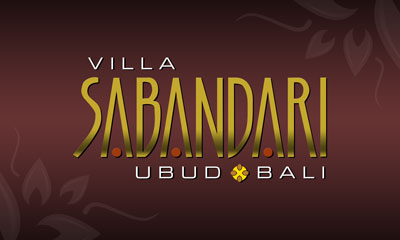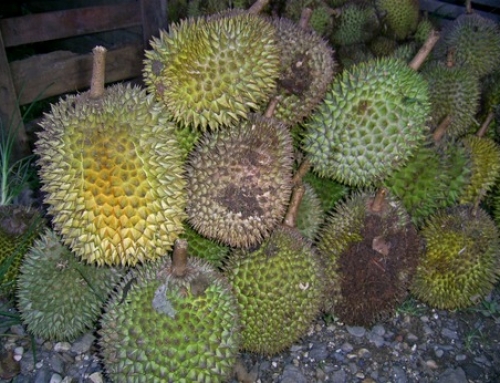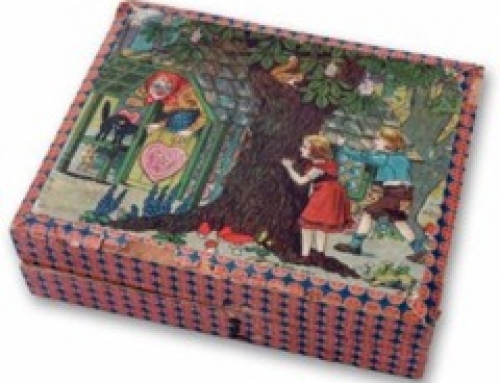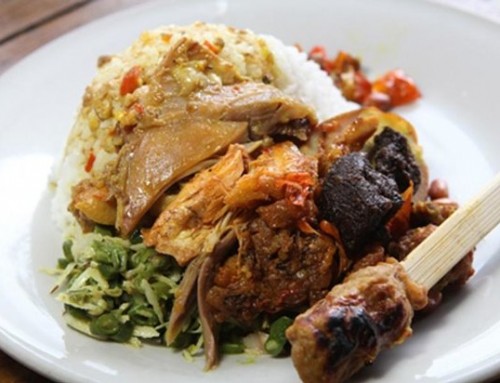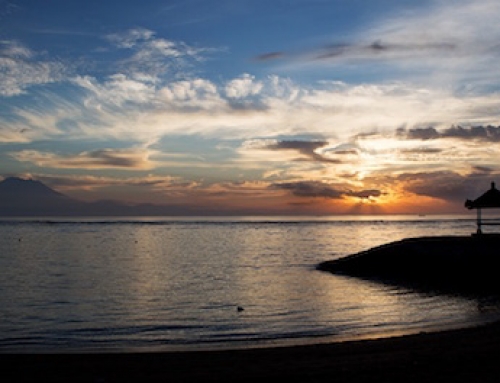Waarom ons klein hotel op Bali ‘Villa Sabandari’ heet.
We zouden dus een klein guesthouse beginnen. Dan moet het kind natuurlijk ook een naam hebben. Een klein hotel op Bali heet al snel “Villa Huppeldepup” waar “Huppeldepup” te vervangen is door één of andere exotisch klinkende naam. “Villa Hibiscus”, “Villa Cempaka”, “Villa Mahayani”,…
Dan konden wij ons hotelletje toch moeilijk “Huisje Weltevree” of “De Purperen Hei” gaan noemen.
Het moest ook iets Oosters en mysterieus klinkend worden.
Omwille van die eerder vermelde frangipani-boom dachten we eerst aan “Villa Frangipani”. We, lees Saar, vond dat wel leuk klinken. Ikzelf associeerde die naam eerder met een frangipanetaart. Dus niet.
Er staat ook een kruidnagelboom, aan de linkerkant zodra je de poort binnenkomt. Kruidnagel in het Maleis is “Cengkeh” en het is één van de kruiden die typisch zijn voor de Molukken. “Villa Cengkeh” dan maar? We stelden ons al voor hoe die naam zou worden vermassacreerd door de verschillende taalgroepen en stapten ook van dit idee af. Het moest dus niet alleen een naam worden met een hoog Multatuligehalte, maar ook één die door iedereen ongeveer op dezelfde manier zou worden uitgesproken.
Back to the drawing board.
“Ons huis” in het dialect van Allang is “Luma Ité”. “Villa Luma Ité”?
We vonden het wel een goed idee om een link te hebben met de Molukse roots van Saar.
Ik was nog niet echt tevreden met de naam en surfte nog maar wat verder. Nu moet je weten dat één van de bekendste en meest exclusieve hotels van Bali het “Amandari Hotel” is. Rod Stewart is er voor de x-ste keer getrouwd en Trina, één van de masseuses heeft de Beckhams, Demi Moore, David Copperfield en Jimmy Carter onder handen genomen. De stap van Amandari naar Sabandari was klein en voor de hand liggend. Voor degenen die dat niet zouden weten: Saar’s familienaam is Sabandar.
Ik vond het onmiddellijk goed en voor inspiraties met een buikgevoel moet je respect hebben.
Het klonk Oosters, was makkelijk uit te spreken én bevatte een link naar de Molukken. De klankverwantschap met het Amandari was ook mooi meegenomen. Saar vond het eerst een raar idee maar draaide snel bij. De Sabandars hebben de reputatie notoire ijdeltuiten te zijn. Op een leuke manier.
De naam “Sabandar” is al heel oud en betekent zoiets als ‘havenmeester”. Je herkent er “Shah” in wat koning of meester betekent en “Bandar” wat haven betekent in Bahasa Indonesia, Maleis en Perzisch.Enkele historische bronnen:”… In this disposition of mind towards us, they had come to a determination to seize our house, and to send all our people prisoners to the top of a high rock, the consent only of the sabandar being a-wanting for taking possession of our goods, though some even began to take our goods forcibly. On the arrival of the sabandar, Mr Spalding waited upon him, and remonstrated upon the unjust conduct of the islanders in taking away our goods, craving his protection. The sabandar then said, that the islanders were resolved we should not do as the Hollanders had done, and were therefore resolved to make all the English prisoners; for the ship was gone, and our intentions seemed bad towards them.”
Uit “Fourth Voyage of the English East India Company, in 1608, by Captain Alexander Sharpey“October 1789. In the afternoon at four o’clock I went on shore and landed at a house by the river where strangers first stop and give an account who they are, whence they came, etc. From this place a Malay gentleman took me in a carriage to Sabandar, Mr. Engelhard, whose house was in the environs of the city on the side nearest the shipping. The Sabandar is the officer with whom all strangers are obliged to transact their business: at least the whole must go through his hands. With him I went to pay my respects to the governor-general who received me with great civility. I acquainted his excellency with my situation and requested my people might be taken care of and that we should be allowed to take a passage to Europe in the first ship that sailed. I likewise desired permission to sell the schooner and launch. All this his excellency told me should be granted. I then took leave and returned with the Sabandar who wrote down the particulars of my wants in order to form from them a regular petition to be presented to the council the next day. I had brought from the governor of Coupang, directed for the governor-general at Batavia, the account of my voyage and misfortune, translated into Dutch from an account that I had given to Mr. van Este. So attentive had they been at Timor to everything that related to us.”
Uit “A Voyage to the South Sea” by William Bligh, published 1792 “The 9th September, we had sight of Socatora, and passing by Tamarind [Tamridal] Bay, came to anchore in Delisha.
The one and twentieth of October we came into Swally.
After the fight on the tentieth of January, in which three Portugall ships were burnt and two frigates sunk, and timber procured for the Hopes main mast (which the Nabob caused to be done so warily that it seemed he was afraid lest the Portugals might know it) on the four and twentieth came a Jesuite with another fellow from the eroy to intreate of peace with Magribocan, who on the seven and twentieth sent the ??Viceroy one hundred and fiftie maunds meale, one hundred sheepe, twentie-five maunds conserves, with hens, etc. In the afternoone the Sabandar requested me to read a letter from the Viceroy, which signified that, whereas by the Padre hee was informed that the Nabob desitred ro make peace in his masters name and had appointed for treatrie thereof then Sabandar, Isaac Beg and Abduram (Abdurrahim) , hee also had hearkened thereto and appointed three others to that businesse, binding himselfe to performe their agreements.”
Uit “Collections taken out of the Journal of Captaine Thomas Elkington. Successour to Captaine Nicholas Downton in the voyage aforesaid written by himselfe, January 1613”
Het moest ook iets Oosters en mysterieus klinkend worden.
Omwille van die eerder vermelde frangipani-boom dachten we eerst aan “Villa Frangipani”. We, lees Saar, vond dat wel leuk klinken. Ikzelf associeerde die naam eerder met een frangipanetaart. Dus niet.
Er staat ook een kruidnagelboom, aan de linkerkant zodra je de poort binnenkomt. Kruidnagel in het Maleis is “Cengkeh” en het is één van de kruiden die typisch zijn voor de Molukken. “Villa Cengkeh” dan maar? We stelden ons al voor hoe die naam zou worden vermassacreerd door de verschillende taalgroepen en stapten ook van dit idee af. Het moest dus niet alleen een naam worden met een hoog Multatuligehalte, maar ook één die door iedereen ongeveer op dezelfde manier zou worden uitgesproken.
Back to the drawing board.
“Ons huis” in het dialect van Allang is “Luma Ité”. “Villa Luma Ité”?
We vonden het wel een goed idee om een link te hebben met de Molukse roots van Saar.
Ik was nog niet echt tevreden met de naam en surfte nog maar wat verder. Nu moet je weten dat één van de bekendste en meest exclusieve hotels van Bali het “Amandari Hotel” is. Rod Stewart is er voor de x-ste keer getrouwd en Trina, één van de masseuses heeft de Beckhams, Demi Moore, David Copperfield en Jimmy Carter onder handen genomen. De stap van Amandari naar Sabandari was klein en voor de hand liggend. Voor degenen die dat niet zouden weten: Saar’s familienaam is Sabandar.
Ik vond het onmiddellijk goed en voor inspiraties met een buikgevoel moet je respect hebben.
Het klonk Oosters, was makkelijk uit te spreken én bevatte een link naar de Molukken. De klankverwantschap met het Amandari was ook mooi meegenomen. Saar vond het eerst een raar idee maar draaide snel bij. De Sabandars hebben de reputatie notoire ijdeltuiten te zijn. Op een leuke manier.
De naam “Sabandar” is al heel oud en betekent zoiets als ‘havenmeester”. Je herkent er “Shah” in wat koning of meester betekent en “Bandar” wat haven betekent in Bahasa Indonesia, Maleis en Perzisch.Enkele historische bronnen:”… In this disposition of mind towards us, they had come to a determination to seize our house, and to send all our people prisoners to the top of a high rock, the consent only of the sabandar being a-wanting for taking possession of our goods, though some even began to take our goods forcibly. On the arrival of the sabandar, Mr Spalding waited upon him, and remonstrated upon the unjust conduct of the islanders in taking away our goods, craving his protection. The sabandar then said, that the islanders were resolved we should not do as the Hollanders had done, and were therefore resolved to make all the English prisoners; for the ship was gone, and our intentions seemed bad towards them.”
Uit “Fourth Voyage of the English East India Company, in 1608, by Captain Alexander Sharpey“October 1789. In the afternoon at four o’clock I went on shore and landed at a house by the river where strangers first stop and give an account who they are, whence they came, etc. From this place a Malay gentleman took me in a carriage to Sabandar, Mr. Engelhard, whose house was in the environs of the city on the side nearest the shipping. The Sabandar is the officer with whom all strangers are obliged to transact their business: at least the whole must go through his hands. With him I went to pay my respects to the governor-general who received me with great civility. I acquainted his excellency with my situation and requested my people might be taken care of and that we should be allowed to take a passage to Europe in the first ship that sailed. I likewise desired permission to sell the schooner and launch. All this his excellency told me should be granted. I then took leave and returned with the Sabandar who wrote down the particulars of my wants in order to form from them a regular petition to be presented to the council the next day. I had brought from the governor of Coupang, directed for the governor-general at Batavia, the account of my voyage and misfortune, translated into Dutch from an account that I had given to Mr. van Este. So attentive had they been at Timor to everything that related to us.”
Uit “A Voyage to the South Sea” by William Bligh, published 1792 “The 9th September, we had sight of Socatora, and passing by Tamarind [Tamridal] Bay, came to anchore in Delisha.
The one and twentieth of October we came into Swally.
After the fight on the tentieth of January, in which three Portugall ships were burnt and two frigates sunk, and timber procured for the Hopes main mast (which the Nabob caused to be done so warily that it seemed he was afraid lest the Portugals might know it) on the four and twentieth came a Jesuite with another fellow from the eroy to intreate of peace with Magribocan, who on the seven and twentieth sent the ??Viceroy one hundred and fiftie maunds meale, one hundred sheepe, twentie-five maunds conserves, with hens, etc. In the afternoone the Sabandar requested me to read a letter from the Viceroy, which signified that, whereas by the Padre hee was informed that the Nabob desitred ro make peace in his masters name and had appointed for treatrie thereof then Sabandar, Isaac Beg and Abduram (Abdurrahim) , hee also had hearkened thereto and appointed three others to that businesse, binding himselfe to performe their agreements.”
Uit “Collections taken out of the Journal of Captaine Thomas Elkington. Successour to Captaine Nicholas Downton in the voyage aforesaid written by himselfe, January 1613”
